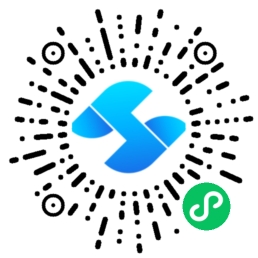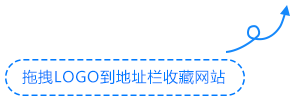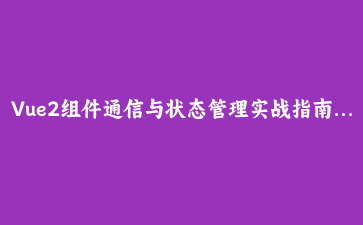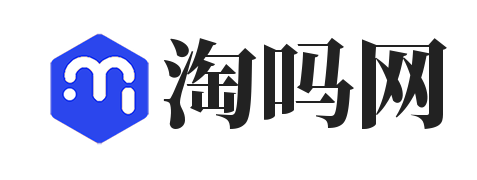
深入掌握Vue2组件间通信方式与状态管理,构建复杂前端应用
Vue2组件通信方式全解析
在Vue2应用开发中,组件通信是核心概念。根据不同的场景需求,Vue2提供了多种组件通信方式。
组件通信方式概览
- Props向下传递:父组件向子组件传递数据
- Events向上传递:子组件向父组件发送消息
- Event Bus全局事件总线:任意组件间通信
- $parent/$children直接访问:父子组件直接访问
- $refs引用访问:访问子组件实例
- Provide/Inject依赖注入:祖先组件向后代组件传递数据
- Vuex状态管理:集中式状态管理
Props与Events基础通信
Props和Events是Vue2中最基础的组件通信方式,适用于父子组件之间的数据传递。
Props向下传递数据
// 子组件
Vue.component('child-component', {
props: {
// 基础类型检测
title: String,
// 多种类型
likes: [String, Number],
// 必填且为对象
author: {
type: Object,
required: true
},
// 默认值
isPublished: {
type: Boolean,
default: false
}
},
template: `
{{ title }}
作者: {{ author.name }}
点赞数: {{ likes }}
已发布
`
});
// 父组件
new Vue({
el: '#app',
data: {
post: {
title: 'Vue2组件通信',
author: { name: '张三' },
likes: 42,
isPublished: true
}
},
template: `
`
});
Events向上传递消息
// 子组件
Vue.component('button-counter', {
template: `
`,
data() {
return {
count: 0
};
},
methods: {
incrementCounter() {
this.count++;
// 向父组件发送事件
this.$emit('increment', this.count);
}
}
});
// 父组件
new Vue({
el: '#app',
data: {
total: 0
},
methods: {
updateTotal(count) {
this.total = count;
console.log(`子组件按钮被点击了${count}次`);
}
},
template: `
总点击次数: {{ total }}
`
});
Event Bus全局事件总线
对于非父子组件间的通信,可以使用Event Bus(事件总线)模式。
创建和使用Event Bus
// 创建Event Bus
const eventBus = new Vue();
// 组件A - 发送事件
Vue.component('component-a', {
template: `
`,
methods: {
sendMessage() {
eventBus.$emit('message-sent', {
text: 'Hello from Component A',
time: new Date()
});
}
}
});
// 组件B - 接收事件
Vue.component('component-b', {
template: `
最新消息: {{ lastMessage }}
接收时间: {{ messageTime }}
`,
data() {
return {
lastMessage: '',
messageTime: null
};
},
mounted() {
eventBus.$on('message-sent', (message) => {
this.lastMessage = message.text;
this.messageTime = message.time.toLocaleTimeString();
});
},
beforeDestroy() {
// 避免内存泄漏,组件销毁前移除事件监听
eventBus.$off('message-sent');
}
});
// 根实例
new Vue({
el: '#app',
template: `
Event Bus示例
`
});
Provide与Inject依赖注入
对于深层嵌套的组件,使用Props逐层传递会非常繁琐,这时可以使用Provide和Inject。
使用Provide和Inject
// 祖先组件
Vue.component('ancestor-component', {
provide() {
return {
theme: this.theme,
user: this.user,
updateUser: this.updateUser
};
},
data() {
return {
theme: 'dark',
user: {
name: '李四',
role: 'admin'
}
};
},
methods: {
updateUser(newUser) {
this.user = { ...this.user, ...newUser };
}
},
template: `
祖先组件
`
});
// 中间组件
Vue.component('middle-component', {
template: `
中间组件(不参与数据传递)
`
});
// 子组件
Vue.component('child-component', {
inject: ['theme', 'user', 'updateUser'],
template: `
子组件(通过Inject获取数据)
用户名: {{ user.name }}
角色: {{ user.role }}
`,
methods: {
changeUser() {
this.updateUser({ name: '王五', role: 'user' });
}
}
});
new Vue({
el: '#app',
template: `
`
});
Vuex状态管理实战
对于大型应用,使用Vuex进行集中式状态管理是最佳选择。
Vuex核心概念
- State:驱动应用的数据源
- Getters:从state中派生的状态
- Mutations:更改state的唯一方法,同步操作
- Actions:提交mutation,可以包含异步操作
- Modules:将store分割成模块
创建Vuex Store
// 创建Vuex Store
const store = new Vuex.Store({
state: {
count: 0,
user: null,
todos: []
},
getters: {
doubleCount: state => state.count * 2,
completedTodos: state => state.todos.filter(todo => todo.completed),
activeTodosCount: (state, getters) => state.todos.length - getters.completedTodos.length
},
mutations: {
INCREMENT(state, payload) {
state.count += payload.amount;
},
SET_USER(state, user) {
state.user = user;
},
ADD_TODO(state, todo) {
state.todos.push(todo);
},
TOGGLE_TODO(state, id) {
const todo = state.todos.find(todo => todo.id === id);
if (todo) {
todo.completed = !todo.completed;
}
}
},
actions: {
incrementAsync({ commit }, payload) {
setTimeout(() => {
commit('INCREMENT', payload);
}, 1000);
},
async fetchUser({ commit }, userId) {
try {
// 模拟API调用
const response = await fetch(`/api/users/${userId}`);
const user = await response.json();
commit('SET_USER', user);
} catch (error) {
console.error('获取用户失败:', error);
}
},
addTodo({ commit }, text) {
const todo = {
id: Date.now(),
text,
completed: false,
createdAt: new Date()
};
commit('ADD_TODO', todo);
}
}
});
在组件中使用Vuex
// 计数器组件
Vue.component('counter-component', {
computed: {
count() {
return this.$store.state.count;
},
doubleCount() {
return this.$store.getters.doubleCount;
}
},
methods: {
increment() {
this.$store.commit('INCREMENT', { amount: 1 });
},
incrementAsync() {
this.$store.dispatch('incrementAsync', { amount: 5 });
}
},
template: `
当前计数: {{ count }}
双倍计数: {{ doubleCount }}
`
});
// 待办事项组件
Vue.component('todo-component', {
data() {
return {
newTodoText: ''
};
},
computed: {
todos() {
return this.$store.state.todos;
},
completedTodos() {
return this.$store.getters.completedTodos;
}
},
methods: {
addTodo() {
if (this.newTodoText.trim()) {
this.$store.dispatch('addTodo', this.newTodoText);
this.newTodoText = '';
}
},
toggleTodo(id) {
this.$store.commit('TOGGLE_TODO', id);
}
},
template: `
待办事项
-
{{ todo.text }}
已完成: {{ completedTodos.length }} / {{ todos.length }}
`
});
// 用户组件
Vue.component('user-component', {
computed: {
user() {
return this.$store.state.user;
}
},
methods: {
fetchUser() {
this.$store.dispatch('fetchUser', 1);
}
},
mounted() {
this.fetchUser();
},
template: `
用户信息
用户名: {{ user.name }}
邮箱: {{ user.email }}
加载中...
`
});
// 根实例
new Vue({
el: '#app',
store,
template: `
Vuex状态管理示例
`
});
实战案例:购物车系统
下面我们使用Vue2和Vuex构建一个完整的购物车系统。
商品列表
{{ product.name }}
价格: ¥{{ product.price }}
购物车
购物车为空
单价: ¥{{ item.price }}
数量:
{{ item.quantity }}
小计: ¥{{ item.price * item.quantity }}
总计: ¥{{ cartTotal }}
商品数量: {{ cartItemsCount }} 件
实现代码解析
// Vuex Store
const store = new Vuex.Store({
state: {
cart: [],
products: [
{ id: 1, name: '商品A', price: 100 },
{ id: 2, name: '商品B', price: 200 },
{ id: 3, name: '商品C', price: 300 },
{ id: 4, name: '商品D', price: 400 }
]
},
getters: {
cartItems: state => state.cart,
cartTotal: state => {
return state.cart.reduce((total, item) => {
return total + (item.price * item.quantity);
}, 0);
},
cartItemsCount: state => {
return state.cart.reduce((total, item) => {
return total + item.quantity;
}, 0);
}
},
mutations: {
ADD_TO_CART(state, product) {
const existingItem = state.cart.find(item => item.id === product.id);
if (existingItem) {
existingItem.quantity++;
} else {
state.cart.push({
...product,
quantity: 1
});
}
},
REMOVE_FROM_CART(state, product) {
state.cart = state.cart.filter(item => item.id !== product.id);
},
INCREASE_QUANTITY(state, product) {
const item = state.cart.find(item => item.id === product.id);
if (item) {
item.quantity++;
}
},
DECREASE_QUANTITY(state, product) {
const item = state.cart.find(item => item.id === product.id);
if (item) {
if (item.quantity > 1) {
item.quantity--;
} else {
state.cart = state.cart.filter(cartItem => cartItem.id !== product.id);
}
}
},
CLEAR_CART(state) {
state.cart = [];
}
},
actions: {
addToCart({ commit }, product) {
commit('ADD_TO_CART', product);
},
removeFromCart({ commit }, product) {
commit('REMOVE_FROM_CART', product);
},
increaseQuantity({ commit }, product) {
commit('INCREASE_QUANTITY', product);
},
decreaseQuantity({ commit }, product) {
commit('DECREASE_QUANTITY', product);
},
clearCart({ commit }) {
commit('CLEAR_CART');
}
}
});
// 根实例
new Vue({
el: '#cart-app',
store,
computed: {
products() {
return this.$store.state.products;
},
cartItems() {
return this.$store.getters.cartItems;
},
cartTotal() {
return this.$store.getters.cartTotal;
},
cartItemsCount() {
return this.$store.getters.cartItemsCount;
}
},
methods: {
addToCart(product) {
this.$store.dispatch('addToCart', product);
},
removeFromCart(product) {
this.$store.dispatch('removeFromCart', product);
},
increaseQuantity(product) {
this.$store.dispatch('increaseQuantity', product);
},
decreaseQuantity(product) {
this.$store.dispatch('decreaseQuantity', product);
}
}
});
组件通信最佳实践
在实际项目中,选择合适的组件通信方式非常重要。
选择通信方式的准则
- 父子组件:优先使用Props和Events
- 兄弟组件:使用父组件作为中介或Event Bus
- 深层嵌套组件:考虑使用Provide/Inject或Vuex
- 多个组件共享状态:使用Vuex
- 简单应用:可以只用Props和Events
- 复杂应用:结合使用多种通信方式
性能与维护建议
- 避免过度使用Event Bus,可能导致难以维护
- 合理划分Vuex模块,避免单个store过于庞大
- 使用mapState、mapGetters等辅助函数简化代码
- 对于大型应用,考虑使用Vuex模块命名空间
- 及时清理事件监听,避免内存泄漏
总结
Vue2提供了多种灵活的组件通信方式,从简单的Props/Events到复杂的Vuex状态管理,可以满足不同场景的需求。
通过本文的学习,你应该已经掌握了:
- Props和Events的基本用法和最佳实践
- Event Bus的创建和使用方法
- Provide/Inject依赖注入的使用场景
- Vuex的核心概念和实际应用
- 如何根据项目需求选择合适的通信方式
在实际项目中,灵活运用这些通信方式,可以构建出结构清晰、易于维护的Vue2应用。
// 购物车系统实现
const store = new Vuex.Store({
state: {
cart: [],
products: [
{ id: 1, name: ‘Vue2教程’, price: 68 },
{ id: 2, name: ‘JavaScript高级编程’, price: 99 },
{ id: 3, name: ‘CSS权威指南’, price: 128 },
{ id: 4, name: ‘前端架构设计’, price: 79 }
]
},
getters: {
cartItems: state => state.cart,
cartTotal: state => {
return state.cart.reduce((total, item) => {
return total + (item.price * item.quantity);
}, 0);
},
cartItemsCount: state => {
return state.cart.reduce((total, item) => {
return total + item.quantity;
}, 0);
}
},
mutations: {
ADD_TO_CART(state, product) {
const existingItem = state.cart.find(item => item.id === product.id);
if (existingItem) {
existingItem.quantity++;
} else {
state.cart.push({
…product,
quantity: 1
});
}
},
REMOVE_FROM_CART(state, product) {
state.cart = state.cart.filter(item => item.id !== product.id);
},
INCREASE_QUANTITY(state, product) {
const item = state.cart.find(item => item.id === product.id);
if (item) {
item.quantity++;
}
},
DECREASE_QUANTITY(state, product) {
const item = state.cart.find(item => item.id === product.id);
if (item) {
if (item.quantity > 1) {
item.quantity–;
} else {
state.cart = state.cart.filter(cartItem => cartItem.id !== product.id);
}
}
}
},
actions: {
addToCart({ commit }, product) {
commit(‘ADD_TO_CART’, product);
},
removeFromCart({ commit }, product) {
commit(‘REMOVE_FROM_CART’, product);
},
increaseQuantity({ commit }, product) {
commit(‘INCREASE_QUANTITY’, product);
},
decreaseQuantity({ commit }, product) {
commit(‘DECREASE_QUANTITY’, product);
}
}
});
new Vue({
el: ‘#cart-app’,
store,
computed: {
products() {
return this.$store.state.products;
},
cartItems() {
return this.$store.getters.cartItems;
},
cartTotal() {
return this.$store.getters.cartTotal;
},
cartItemsCount() {
return this.$store.getters.cartItemsCount;
}
},
methods: {
addToCart(product) {
this.$store.dispatch(‘addToCart’, product);
},
removeFromCart(product) {
this.$store.dispatch(‘removeFromCart’, product);
},
increaseQuantity(product) {
this.$store.dispatch(‘increaseQuantity’, product);
},
decreaseQuantity(product) {
this.$store.dispatch(‘decreaseQuantity’, product);
}
}
});





